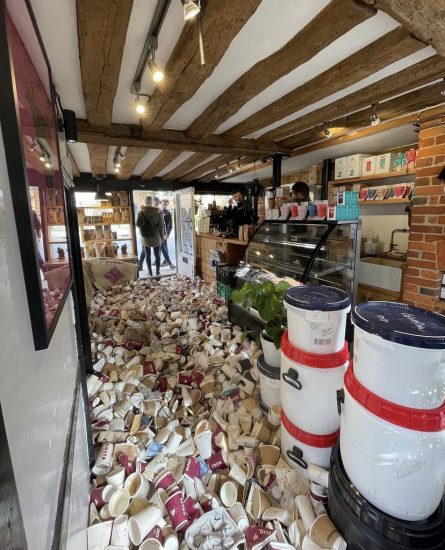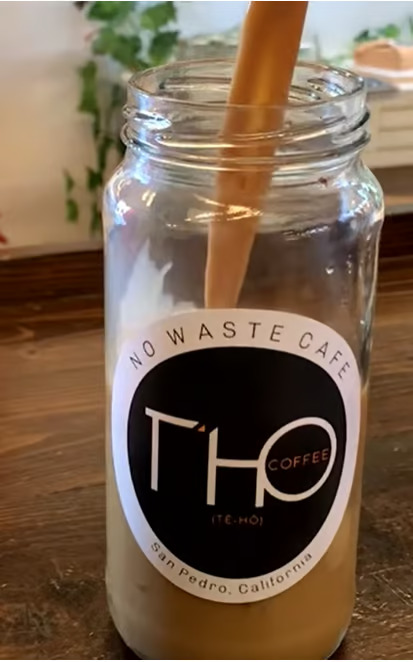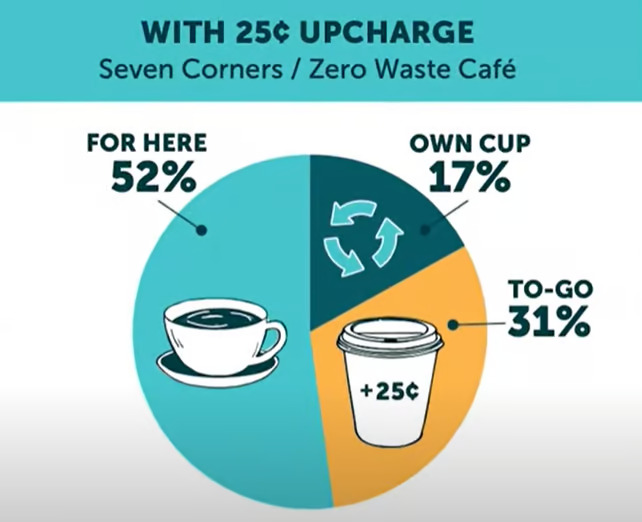Trying to change people’s behavior is a core part of marketing. But when a business relies too heavily on this approach, it can risk its future—especially for small businesses like a coffee shop, where even small missteps can seriously affect profits.
Yet that’s exactly what the owners of Otto Coffee House in Kent chose to do.
Over the course of a month, they collected more than 15,000 discarded disposable cups from around the town and scattered them across the shop floor.
Customers who wanted their coffee in a disposable cup had to make the “walk of shame” through a sea of trash just to reach the counter.

But what about people with reusable cups?
Customers who brought their own could collect their orders directly at the counter, avoiding the “walk of shame.”
Many of those who did endure the “walk of shame” were genuinely concerned about their environmental impact. The phrase they once used to justify their actions—“It’s just one cup”—was no longer reassuring. In fact, it underscored a global problem.
This coffee shop made a bold attempt to prove a crucial point: when 8 billion people say, “It’s just one cup,” the impact on the planet is devastating.
What happened after the “walk of shame” campaign?
The owners moved from the high streets of Sevenoaks to Cornwall, where they continued their mission. Now, if customers don’t bring their own cup, they can get their coffee in a reusable jar with a £1 deposit. Once they return the jar, they receive their deposit back.

They also have a mug wall, where customers can choose a cup from the aisles and return it once they’ve finished drinking.

But if they’re in a hurry and want a to-go cup, there’s a 25-cent upcharge to help offset the carbon footprint.
Why Did They Implement a $1 Deposit and a 25¢ Upcharge?
Drawing inspiration from the book Nudge, they realized that people are more motivated by the fear of loss than by the promise of gain. This insight was reinforced by observing that Starbucks’ 25¢ discount for bringing a reusable cup had little effect on customer behavior.
Instead of offering a reward, they decided to introduce a subtle penalty—instilling a sense of loss—to encourage change. By asking for a $1 deposit and a 25¢ upcharge for disposable cups, they ensured customers felt the financial impact of their choices, making them more likely to adopt sustainable habits.
They changed the message from “Bring your own cup to get a 25-cent discount” to “This cup costs you 25 cents if you’re in a hurry, or, if you have time, enjoy your coffee in a jar with a dollar deposit.”
When they tracked customer behavior before and after implementing the upcharge, the use of disposable to-go cups dropped from 66% to 30%. This shift effectively halved the number of cups heading to landfills.

Although it was nerve-wracking for the owners at first, customers embraced the company’s vision and later understood the importance of taking personal responsibility.
In fact, they didn’t just go along with the change — they talked about it, shared it with friends, and helped it grow into something bigger.
“It’s a great example of how pushing the limits can shape consumer behavior—and spark some real word-of-mouth buzz.”
From The Founder
“After some harrowing research we decided we couldn’t wait for our local council to pull their finger out of their arse, so we took a pretty chunky risk to demonstrate that it can and should be done differently”.
“There have been some very difficult conversations, we have lost some customers, there have been lots of lessons to learn VERY quickly, but overall we have received an unbelievable & overwhelming amount of support.
“Thank you to every-one who has burst through the doors with your #reusable cup in hand. Thank you to all the businesses & individuals that have advised us & showed your support.
Thank you to those of you that patiently let us explain what we are trying to achieve & left with a #reusable cup in hand.”
